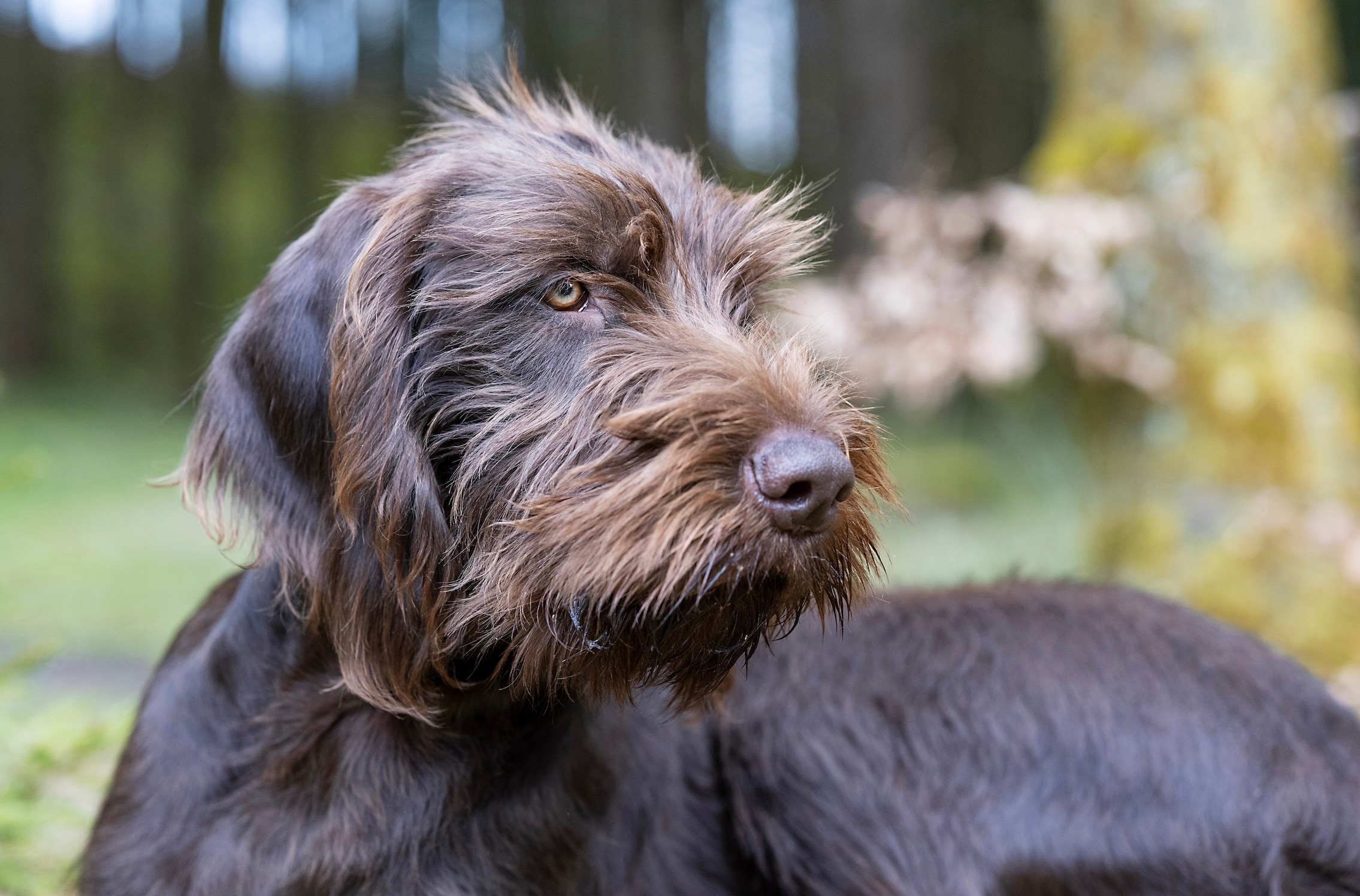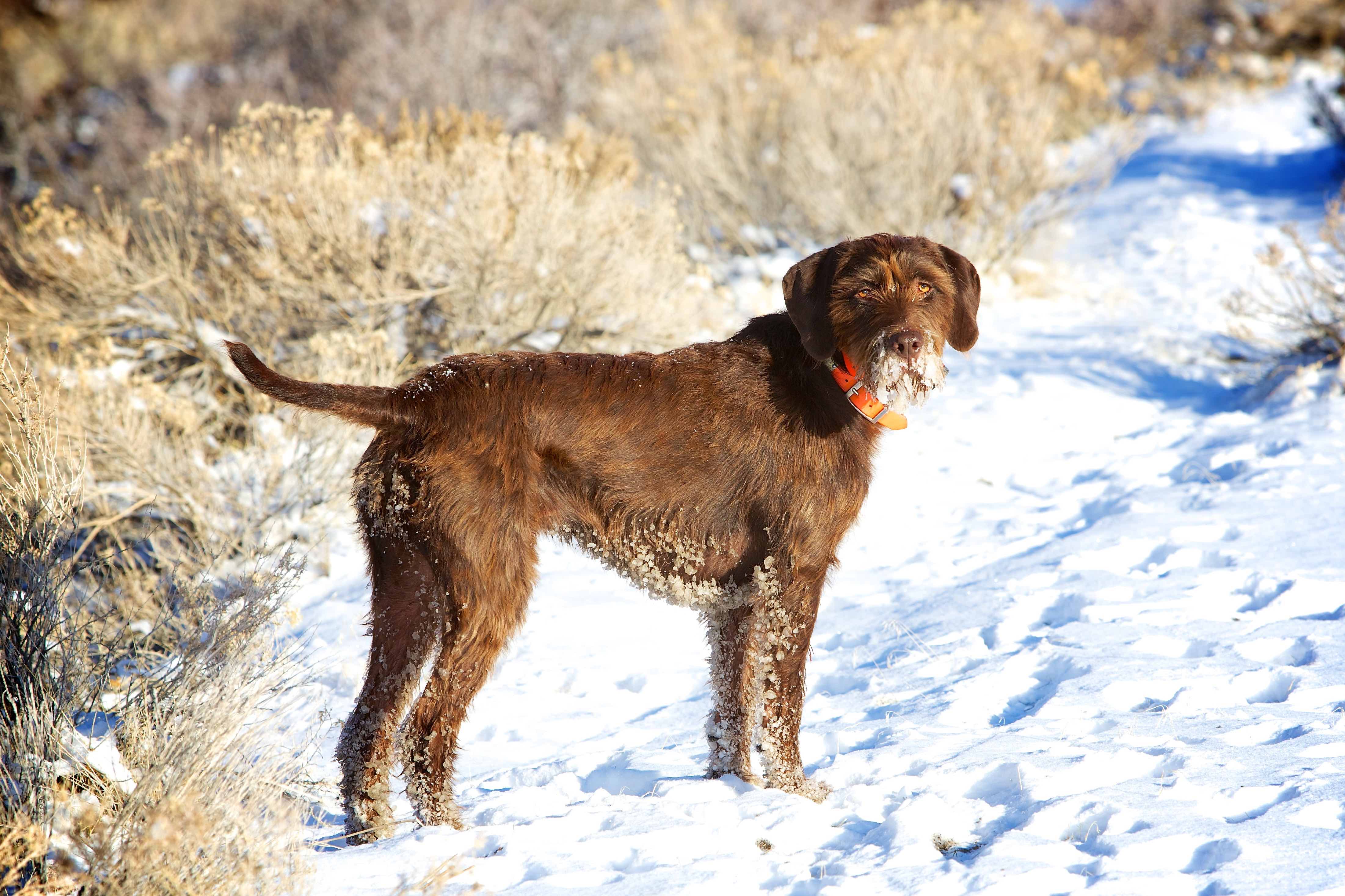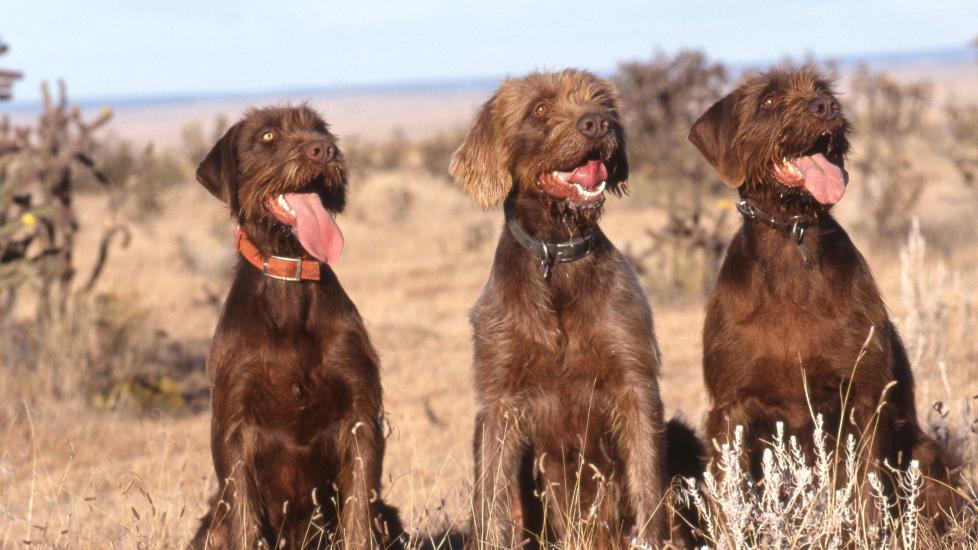Pudelpointer
Adobe Stock/Callaloo Twisty
In the late 1800s, dog breeders in Germany created the Pudelpointer by breeding Poodles with Pointers. According to the Pudelpointer Club of North America (PCNA), the goal was to create a working bird dog breed that’s highly intelligent, friendly, easy to train, and a skilled hunter both in water and on land.
A Pudelpointer dog stands 22–26 inches at shoulder height and can weigh 45–70 pounds, depending upon the gender. With colors in liver (brown) or black, Pudelpointers have a double coat that protects them against harsh weather and briars when they do field work.
Caring for a Pudelpointer
German Pudelpointers are loving toward their family, and can be well behaved around children and other dogs as long as they are properly trained and socialized at an early age. They have a lot of energy and do best with active, outdoorsy families. Pudelpointers have a passion for hunting and prefer to be outside, going after game birds on various types of terrain, such as rivers, fields, and ponds.
Due to their keen intellect, Pudelpointers can be easy to train. Their coat consists of two layers, which keep them protected when they run through fields or in harsh weather. Pudelpointers shed seasonally and have low-maintenance grooming needs, consisting of a weekly brushing and the occasional bath when their coats get dirty or smelly.
Pudelpointer Health Issues

The original Pudelpointer breeders in Germany were very selective in their breeding to create a smart, loyal, and easily trainable dog with minimal health issues. Because of this, Pudelpointers are typically healthy dogs that live to be 14 years old on average.
That said, the dogs can develop a few health conditions throughout their life.
Epilepsy
Primary epilepsy refers to seizure activity in dogs that may occur sporadically or frequently with no identified underlying cause. Symptoms usually develop at an early age (typically when a Pudelpointer is 1–4 years old) and may include:
-
Unconsciousness
-
Dilated pupils
-
Full-body tremors
-
Vocalization
-
Urination and/or defecation
Treatment involves one or more oral anti-seizure medications that must be given long-term to prevent seizures.
Hip Dysplasia
Hip dysplasia is an inherited orthopedic condition where the hip joint doesn’t properly align. This can be painful and, over time, cause arthritis in dogs. Hip dysplasia can develop in one or both hip joints. Symptoms include:
-
Lameness
-
Slowness to rise from a lying position
-
A bunny-hopping gait when running
-
Reluctance to run, jump, or go up or down stairs
-
Holding the affected leg out to the side when sitting up
Hip dysplasia can often be managed with joint supplements and certain medications. If the condition is serious enough, surgery may be required.
What To Feed a Pudelpointer
Pudelpointers should be fed a high-quality dog food formulated for medium to large breeds, depending on your dog’s weight. As with all dogs, their daily diet should consist of 90% dog food and no more than 10% treats.
How To Feed a Pudelpointer
Pudelpointers should be fed twice daily: morning and evening. Pudelpointer puppies need to eat more frequently; at least three meals every day.
The diet should be based on their life stage, with Pudelpointer puppies eating puppy food, dogs over 1 year old eating adult food, and older dogs eating senior food. Whichever food you choose, make sure it meets the nutritional standards set by the Association of American Feed Control Officials (AAFCO).
For fast eaters, a slow-feeder bowl is recommended to prevent gastrointestinal upset.
How Much Should You Feed a Pudelpointer?
The amount to feed your Pudelpointer varies; start by following the feeding guidelines on your dog food packaging. Your veterinarian can also help you determine the proper portions to feed your Pudelpointer based on your dog’s ideal body weight, lifestyle, and life stage.
Pudelpointers can become overweight if they overeat, so it’s important to measure their food portions and limit their treats.
Nutritional Tips for Pudelpointers
The Pudelpointer is a healthy dog breed that receives daily nutritional requirements by eating high-quality dog food. As long as your dog’s diet is AAFCO-approved, they shouldn’t need supplementation.
However, if your Pudelpointer has hip dysplasia, your veterinarian may recommend starting your dog on a joint supplement or prescription joint diet to minimize inflammation.
Behavior and Training Tips for Pudelpointers
Pudelpointer Personality and Temperament
These dogs were bred to be the ultimate hunters. Because of this, the typical Pudelpointer temperament is eager to please and energetic. Pudelpointers need at least two hours of exercise every day to expend their energy and stay mentally stimulated. They thrive when they have a job.
Pudelpointer Behavior
Pudelpointers can do well around other dogs if they’re socialized as puppies. They can also do well around children who know how to interact with animals.
However, because of their long history as hunters, Pudelpointers have a strong prey drive and might not do well around small animals, such as cats and pocket pets like guinea pigs. Make sure introductions to smaller pets are done slowly and correctly, and always supervise your Pudelpointer when they’re outside.
Pudelpointers need at least two hours of exercise every day to expend their energy and stay mentally stimulated.
Pudelpointer Training
Pudelpointers are easy to train due to their smarts and eagerness to please. They thrive in activities such as agility and obedience. This breed requires a family who is devoted to keeping them active in both outdoor activities and training sessions.
If you decide to take your Pudelpointer hunting, make sure to follow proper safety precautions and train your dog to be comfortable in the field.
Fun Activities for Pudelpointers
-
Hunting waterfowl in the field or water
-
Retrieving balls and Frisbees
-
Obedience and agility training
-
Rally
Pudelpointer Grooming Guide

All Pudelpointers have a double coat to protect them in the hunting field, but there are three distinct coat types your dog may have:
-
A smooth or short coat that lies close to your dog’s body and is ideal for warmer climates
-
A wiry coat that is coarse, dense, and longer at some parts of the body than others
-
A rough coat that is medium-length and ideal for colder climates
Skin Care
Pudelpointers do not require special skin care. They only need baths when their coats are dirty or have an odor.
Because Pudelpointers love to spend time outside, check your dog’s skin for ticks regularly and stay current on heartworm and flea and tick preventatives.
Coat Care
Brushing once a week prevents matting and reduces shedding, which occurs seasonally. Pudelpointers do not need a professional groomer.
Eye Care
Pudelpointers do not have special eye care needs. Contact your veterinarian if you notice changes in your dog’s eyes, such as redness or discharge.
Ear Care
Pudelpointers are not prone to frequent ear infections like some dog breeds. However, they can develop ear infections occasionally, especially if they get water in their ears when swimming or hunting for waterfowl.
Cleaning their ears with a routine ear cleaner that contains a drying agent can help minimize ear infections. It’s best to clean their ears after a bath or any water activity.
Nail Care
As with all dog breeds, keep their nails short to prevent them from splitting during field work or other dog sporting events.
Considerations for Pet Parents
Pudelpointers have a lot of energy and need a family who will meet their activity needs. The perfect home for a Pudelpointer has a large fenced backyard where they can run, with a pet parent or family who will take them on outdoor adventures or enroll them in training or sporting events. This breed must have mental and physical stimulation to prevent boredom and stay fit. Pudelpointers will not be good dogs for those with laid-back lifestyles.
Pudelpointer FAQs
Are Pudelpointers hypoallergenic?
No, Pudelpointers are not considered to be hypoallergenic dogs.
Can Pudelpointers handle cold weather?
Yes. Many Pudelpointers can be comfortable in colder weather thanks to their double coat. However, smooth-coated Pudelpointers are better suited for warm weather.
Is a Pudelpointer a good dog?
Yes, Pudelpointers are loyal and affectionate to their loved ones, and can be easy to train.
